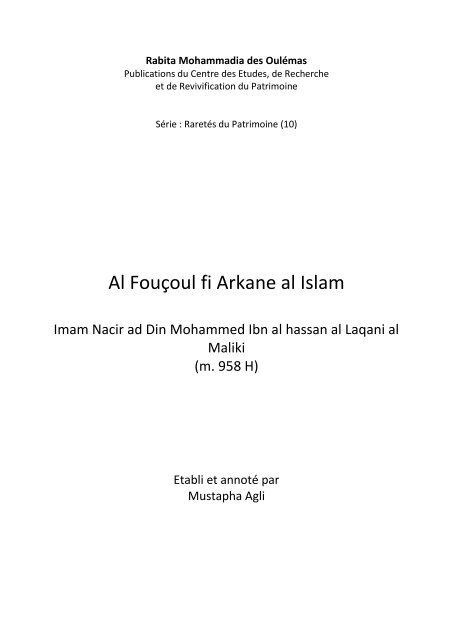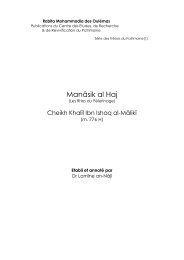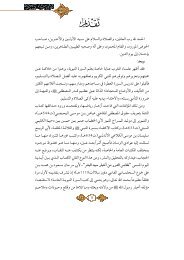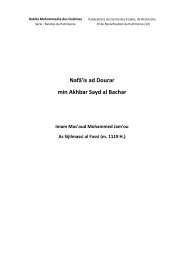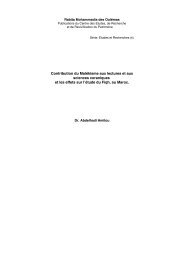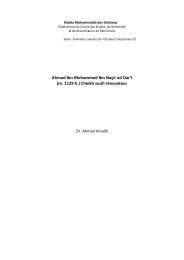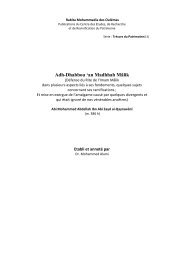Al Fouçoul fi Arkane al Islam
Al Fouçoul fi Arkane al Islam
Al Fouçoul fi Arkane al Islam
Create successful ePaper yourself
Turn your PDF publications into a flip-book with our unique Google optimized e-Paper software.
Rabita Mohammadia des Oulémas<br />
Publications du Centre des Etudes, de Recherche<br />
et de Revivi<strong>fi</strong>cation du Patrimoine<br />
Série : Raretés du Patrimoine (01)<br />
<strong>Al</strong> <strong>Fouçoul</strong> <strong>fi</strong> <strong>Arkane</strong> <strong>al</strong> <strong>Islam</strong><br />
Imam Nacir ad Din Mohammed Ibn <strong>al</strong> hassan <strong>al</strong> Laqani <strong>al</strong><br />
M<strong>al</strong>iki<br />
(m. 958 H)<br />
Etabli et annoté par<br />
Mustapha Agli
<strong>Al</strong> <strong>Fouçoul</strong> <strong>fi</strong> <strong>Arkane</strong> <strong>al</strong> <strong>Islam</strong><br />
Imam Nacir ad Din Mohammed Ibn <strong>al</strong> Hassan <strong>al</strong> Laqani<br />
<strong>al</strong> M<strong>al</strong>iki (m. 958 H)<br />
Les savants et les érudits des diverses disciplines affectionnent<br />
particulièrement les genres d’écrit sous forme éditions réduites ou abrégés<br />
considérées comme des introductions par lesquelles il faut commencer<br />
toute étude ou recherche. Ces abrégés traitent des aspects essentiels et de<br />
ce qu’il convient de ne pas ignorer dans la discipline concernée. Ainsi, dans<br />
notre patrimoine islamique, nous trouvons des études abrégées dans les<br />
sciences du Coran, du Hadith, du Fiqh, de la grammaire, de la logique, etc.<br />
Il est bien connu que l’assimilation des sujets de ces abrégés était, pour<br />
l’étudiant, le vrai début de l’approfondissement de l’étude et la<br />
spéci<strong>al</strong>isation dans sa discipline.<br />
Parmi les abrégés les plus importants, concernant le Fiqh m<strong>al</strong>ékite, il y a<br />
<strong>al</strong> <strong>Fouçoul</strong>, de l’Imam Nacir ad Din <strong>al</strong> Laqani, que nous sommes <strong>fi</strong>ers de<br />
présenter aujourd’hui parmi les publications du Centre d’Etude, de<br />
Recherche et de Revivi<strong>fi</strong>cation du Patrimoine de la Rabita Mohammedia<br />
des Oulémas. Cet ouvrage traite des cinq piliers de l’islam et de ce qu’il<br />
convient de ne pas ignorer du Fiqh et de la doctrine en partant de Les<br />
piliers et des règles génér<strong>al</strong>es dans le hadith d’Ibn Omar, <strong>fi</strong>gurant dans les<br />
çahihs de Boukhari et de Muslim, selon lequel le prophète a dit : « L’<strong>Islam</strong><br />
est construit sur cinq éléments : attester qu’il n’y a d’autre dieu que Dieu<br />
et que Mohammed est le Messager de Dieu, accomplir la prière, donner<br />
la Zakat (aumône lég<strong>al</strong>e), accomplir le pèlerinage et jeûner le mois de<br />
Ramadan ».<br />
Dans cet ouvrage l’auteur explicite les fondements de l’unicité ; puis les<br />
règles de la prière, de la Zakat, du jeûne et du pèlerinage, en distinguant<br />
entre les obligations, les actes conformes à la sunna et les Fada’il (vertus) ;<br />
en soulignant les conditions de leurs obligation, v<strong>al</strong>idité et annulation ; en<br />
death of sheikh Kh<strong>al</strong>il his science was inherited by nacir ad Din <strong>al</strong> Laqani.<br />
Historians consider him to be the Sheikh of his times Ulemas in Egypt.<br />
Among his praising of Sheikh Kh<strong>al</strong>il let’s cite this one: “We are Kh<strong>al</strong>ilians;<br />
we support him even if he was mistaken”.<br />
238
étayant son discours par les paroles de l’Imam M<strong>al</strong>ik et des Oulémas de<br />
l’école m<strong>al</strong>ékite, sans se laisser <strong>al</strong>ler dans des discussions interminables et<br />
en privilégiant un langage clair.<br />
L’auteur s’appuie beaucoup sur les propos de Sheikh Kh<strong>al</strong>il Ibn Ishaq <strong>al</strong><br />
Joundi (m. 776 H) et il n’est pas étonnant qu’un siècle après la mort de ce<br />
dernier sa science soit héritée par le <strong>Al</strong>em Nacir ad Din <strong>al</strong> Laqani que les<br />
historiens considèrent comme le Sheikh des Oulémas, de son temps, en<br />
Egypte. Parmi ses diverses paroles d’admiration pour Sheikh Kh<strong>al</strong>il nous<br />
retenons celle-ci : « Nous sommes des kh<strong>al</strong>iliens ; s’il [Sheikh Kh<strong>al</strong>il] s’est<br />
trompé, nous sommes avec lui ».<br />
Le Centre de Recherche de la Rabita Mohammedia des Oulémas a<br />
consulté deux manuscrits de l’ouvrage dont l’un provient de l’Université<br />
Qarawiyine à Fès et l’autre de Dar <strong>al</strong> Koutoub <strong>al</strong> Masriya au Caire.<br />
Traduction : Mekaoui Abdélilah<br />
237
<strong>Al</strong> Fusul <strong>fi</strong> <strong>Arkane</strong> <strong>al</strong> <strong>Islam</strong><br />
Imam Nacir ad Din Mohammed Ibn <strong>al</strong> Hassan <strong>al</strong> Laqani <strong>al</strong> M<strong>al</strong>iki (d.<br />
958 H)<br />
Ulemas and learned writers in various disciplines particularly like writings<br />
under the form of summaries or short guides which are considered as<br />
introductions one has to study <strong>fi</strong>rst in any study or research. These short<br />
guides de<strong>al</strong> with the main aspects and with what must not be ignored in a<br />
concerned discipline. Thus, in <strong>Islam</strong>ic patrimony, we can <strong>fi</strong>nd short studies<br />
in the sciences of Quran, Hadith, Fiqh, grammar, logic, etc. For students,<br />
assimilating these short studies was the beginning of their studies and the<br />
speci<strong>al</strong>ization in their disciplines.<br />
Concerning M<strong>al</strong>ekite Fiqh, one of the most important short studies is the<br />
<strong>al</strong> Fusul of Imam Nacir ad Din <strong>al</strong> Laqani which we are proud to present<br />
among the publications of the Patrimony Reviv<strong>al</strong>, Research and Studies<br />
Centre of the Muhammadan League of Religious Scholars. This book de<strong>al</strong>s<br />
with the <strong>fi</strong>ve pillars of <strong>Islam</strong> and of essenti<strong>al</strong>s of Fiqh and doctrine starting<br />
with the pillars and the gener<strong>al</strong> rules in the hadith of Ibn Omar, which is<br />
listed in the Sahihs of Bukhari and Muslim and according to which the<br />
Prophet said: “ <strong>Islam</strong>is built on <strong>fi</strong>ve elements: to attest that there is no<br />
other god than God and that Mohammed is the Messenger of God, to do<br />
the prayer, to give the Zakat, to do the pilgrimage and to fast during the<br />
month of Ramadan”.<br />
In this book the author explains the basis of monotheism; than the rules<br />
of prayer, Zakat, fasting and pilgrimage distinguishing between obligations,<br />
acts conform to Sunna and Fada’il (virtues); stressing on the conditions of<br />
their obligation, v<strong>al</strong>idity and annulations; citing the sayings of Imamm<strong>al</strong>ik<br />
and the M<strong>al</strong>ekite school Ulemas, without indulging in long discussions and<br />
adopting a concise language.<br />
The author relies on the sayings of Sheikh Kh<strong>al</strong>il Ibn Ishaq <strong>al</strong> Jundi (d. 776<br />
H). It is not surprising that a century after the<br />
240
The Patrimony Reviv<strong>al</strong>, Research and Studies Centre of the<br />
Muhammadan League of Religious Scholars consulted two manuscripts of<br />
the book, one from the Qarawiyine in Fes ans the other from Dar <strong>al</strong> Kutub<br />
<strong>al</strong> Masriya in Cairo.<br />
Translation : Mekaoui Abdélilah<br />
239


